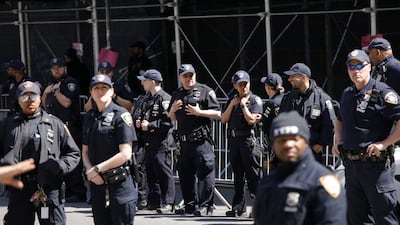Donald Trump on Tuesday became the first former US president to be criminally charged after he pleaded not guilty to 34 felony counts stemming from an investigation into alleged hush money paid to adult film actress Stormy Daniels during his 2016 presidential campaign.
The spectacle that unfolded in New York — in which throngs of protesters and supporters as well as hundreds of members of the media had gathered outside the Manhattan Criminal Courthouse — is only the beginning of what could be a fairly lengthy process.
It could take months or even longer for the legal process to play out and for the trial — scheduled to begin in January 2024 — to conclude, if it goes ahead as scheduled.
Here is what will come next for America's first criminally charged former president:
The 'discovery' phase
Manhattan prosecutors and Mr Trump's defence team must first engage in what is called the discovery phase, in which both parties exchange information on the evidence they are to present during the trial. They also will exchange information on witnesses they intend to call.
Prosecutors, for instance, must hand over evidence they uncovered during the investigation, as well as testimony presented to the New York grand jury. The Manhattan District Attorney's office must submit all evidence within 15 days of Mr Trump's arraignment, NBC News reported.
During discovery, lawyers may also seek depositions, which the American Bar Association says is one of the most common ways of gathering and presenting evidence.
Depositions allow both parties to know what a witness might say during the trial. The opposing party may also use depositions to try to discredit the witness's evidence.
Motions to be filed
Judge Juan Merchan gave Mr Trump's legal team a deadline of August 8 to file motions in the case.
One such motion would be to dismiss the case altogether, which Mr Trump and his legal team have already suggested they intend to do.
“I don't think this case is going to see a jury,” said Joe Tacopina, one of Mr Trump's defence lawyers.
The indictment, filed by Manhattan District Attorney Alvin Bragg, charges Mr Trump with 34 felony accounts of falsifying business records in New York. But the actual case rests on a legal theory that has never been tested in court.
Mr Trump was accused of arranging a $130,000 payment to Daniels through his lawyer Michael Cohen to buy her silence before the 2016 election.
“The scheme violated New York election law, which makes it a crime to conspire to promote a candidacy by unlawful means,” Mr Bragg said during a Tuesday news conference.
But it remains unclear whether Mr Bragg is able to use evidence of a federal crime to charge a defendant under New York law. Republicans loyal to the former president and even some of his opponents have accused the district attorney of overreach.
“The prosecutor’s overreach sets a dangerous precedent for criminalising political opponents and damages the public’s faith in our justice system,” Senator Mitt Romney, who found Mr Trump guilty in both of his impeachment proceedings, said in a statement.
Mr Trump has also suggested that he intends to file a motion to change the venue from Manhattan to Staten Island, which would affect the jury's make-up.
He has already claimed he would not get a fair trial in Manhattan because of the island's large Democratic population and because he is too well known there.
In the 2020 election, Democratic challenger Joe Biden won the borough of Manhattan by more than 74 per cent.
Under the US Constitution, every defendant has the right to a fair and speedy trial in which they are judged by their peers. Mr Trump's team could argue that the Manhattan electorate would make a fair trial virtually impossible for the Queens native.
Prosecutors would have until September 19 to respond to the defence team's motions.
December 4 hearing
Mr Merchan set the next in-person hearing for December 4, when Mr Trump will be due back in court.
During this hearing, the judge will consider the motions filed by the defence team and whether to dismiss the case.
January 2024 trial start date
Mr Merchan set an initial trial date of January 2024, although that could be dismissed altogether or delayed. x
Under New York law, the prosecution team must be ready to try a felony within six months of arraignment.
But defendants can also try to postpone the proceedings. It is a tactic Mr Trump is already familiar with, having done so over an investigation into his potential mishandling of classified documents.
Democrat-led efforts to hand over his tax returns were not resolved more than a year after he had already left office.
A presidential campaign
What makes Mr Trump different than every other accused criminal is that he is a former president seeking a return to the White House. Mr Trump is currently the front-runner for the Republican nomination, recent data polling has shown.
Should the trial go ahead as scheduled, the January 2024 trial start date would start one month before the Iowa Republican Caucus, the first stop in the US primary season.
And Mr Trump's campaign has already begun fundraising off the indictment itself, selling T-shirts featuring fake mugshots of the Republican contender for $36.
But with the court trial and primary season still several months off, it is almost impossible to predict how Mr Trump's legal predicament will ultimately play out.
Another wild card is that Mr Trump is also at the centre of several other investigations, including one in Georgia about possible election interference. If he is indicted in any other cases, that could affect his New York trial timeline.



















